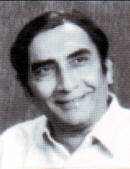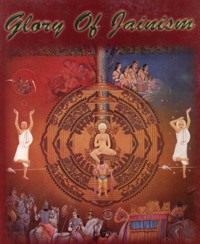Shri Haribhadrasuri
Acharya Haribhadrasuri, a great author with powerful personality, had written many books in Sanskrit and Prakrit. His versatile scholarship, unmatched knowledge, acute critical faculty and mastery of language have earned for him a distinguished place in the history of Indian literature. The 1444 books deemed to have been written by him are regarded as the most valuable treasure of knowledge of the Jain religion. He was the first commentator of the Agamas (Jain canonical literature) and through his books he blazed a new trail in meditation.
Uncommon and extraordinary was his life. He was the family priest of king Jitari of Chittor. Besides being an authority on the Veda and Darshanshastra (Jain Philosophy), he possessed thorough knowledge in 14 faculties of studies. In his own times, there was nobody in the entire country to challenge and defeat him in debate and discussions. In Kali age he thought himself to be the only scholar with the perfect knowledge of scriptures and in his great arrogance had taken a vow that if anyone defeated him he would become a disciple of that scholar.
Once upon a time, while he was passing by Dharmagar in a palanquin, he happened to listen to a gatha (verse) being sung in a tranquil and melodious voice. Pandit Haribhatt made numerous efforts to interpret its meaning but he failed to understand it. He had mastered four Vedas, all the Upnishads and eighteen Purans as also all the branches of knowledge and yet he failed to make out the meaning of the verses. He felt small and his pride in being knowledgeable began to melt. In all humility, he went to the Sadhviji and requested her to interpret the ‘gatha’ for him.
Sadhvi Mahattara Yakini requested him to come the next day in the presence of her Guru who would explain the meaning of the gatha. Accordingly, Acharya Jindattasuri arrived there the next day and offered an interpretation, whereupon Haribhatt became his disciple and in course of time Pandit Haribhatt came to be known as Acharya Haribhadrasuri.
Since Sadhvi Yakini Mahattara had done an unusual obligation by way of exposing new horizons in the pursuit of knowledge, Haribhadrasuri regarded her as his mother. Now he disliked to be known by the epithet of Kalikalsarvagna (omniscient in the Kali age). As he acquired a deep understanding and knowledge of Jain scriptures, he called himself alpamati - a person having very little knowledge. He concluded every book that he wrote with an invariable expression of deep gratitude to Sadhvi Yakini Mahattara and introduced himself as Dharmaputra of Yakini Mahattara.
Because of his hatred for the Jain religion Haribhatt used to say that it would be better to die by being crushed under the feet of a mad elephant than to seek shelter in a Jain Temple. Ironically enough the very Haribhatt had to seek a shelter in a Jain temple to save himself from a mad elephant. Having looked at the idol of Jina he had also joked saying ‘your body itself is an evidence of your having relished sweet dishes, because if hunger struck, a tree it would not be fresh and green forever’.
But strange are the ways of Nature. In course of time, he himself came to realize the significance and greatness of the Jain religion and the Jain temple and subsequently he modified his thoughts and words. It is so said that he used to write books at night in the light of a gem given to him by Lallig Sheth.
His life-time is supposed to be from A. D. 700 to 770.
 Dr. Kumarpal Desai
Dr. Kumarpal Desai

